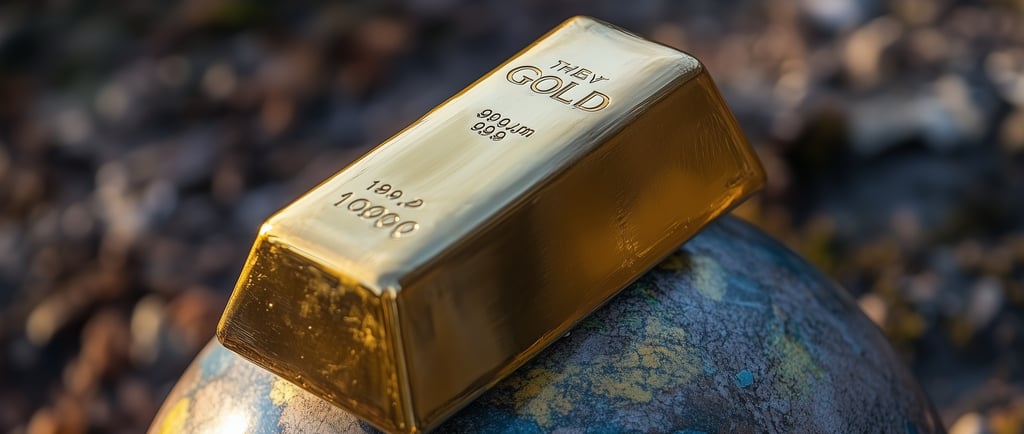

Disclosure: Clicking on links may earn me commission at no additional cost to you. Thank you for reading!
Discover the crucial role of gold reserves in maintaining economic stability and safeguarding against inflation.
Why Gold is So Important to the Economy
Disclaimer: This website and its content are for informational purposes only and is not financial advice.
Gold acts as a safe-haven asset during uncertainty, a hedge against inflation, and a store of value, maintaining wealth across time. Its limited supply also contributes to its value. Historically, it has underpinned monetary systems.
The History of Gold's Economic Influence
For centuries, gold has held a unique place in human civilization. Its inherent beauty, rarity, and resistance to corrosion made it a desirable material for jewelry and ornamentation. However, its significance goes far beyond aesthetics. The journey of gold from a decorative object to a financial powerhouse is one of the most compelling narratives in economic history.
Gold's importance to the economy stems from its historical role as a form of currency and a store of value. Think back to ancient times – gold coins were a common medium of exchange, facilitating trade and commerce.
From the Lydians in the 7th century BC, who are credited with minting the first official gold coins, to the Roman Empire, where the aureus coin was the standard, gold has been a universally accepted form of payment. This made it possible to conduct business and accumulate wealth in a way that was not dependent on the specific currency of a single kingdom.
Even as societies evolved and paper currencies emerged, gold retained its importance as a benchmark against which the value of these currencies could be measured. This was most famously institutionalized through the gold standard, a monetary system where a country's currency or paper money had a direct and fixed value based on a specific amount of gold.
For a long time, nations pegged their currencies to gold, which provided stability and predictability to international trade. The British Empire, a pioneer of the gold standard in the 19th century, saw its currency become the most trusted in the world. While the gold standard is no longer in use today, its legacy highlights exactly why gold is so important. It provided a sense of security and stability to financial systems for over a century.
Gold as a Safe Haven in Economic Uncertainty
One of the key reasons why gold is so important is its role as a safe-haven asset. In times of economic uncertainty or financial crises, when traditional investments like stocks and bonds might decline in value, gold often tends to hold its value or even appreciate. This is because gold is seen as a tangible asset with intrinsic worth, not tied to the performance of any particular company or government.
Investors often flock to gold during turbulent times as a way to preserve their wealth, contributing to its continued importance in the global economy. This "flight to safety" behavior is a powerful testament to the trust investors place in this precious metal. It's an asset that doesn't rely on promises; it simply is. This intrinsic value is a primary factor in why gold is so important in a world of complex and sometimes fragile financial instruments.
Here is a look at how gold performed during some of the most significant economic crises of the 21st century:
2008 Financial Crisis: As the global economy was on the brink of collapse, gold prices surged. The price per ounce rose from around $920 in January 2008 to over $1,090 by December 2009, an increase of over 18%. In contrast, the S&P 500 lost approximately 57% of its value during the same period from its peak in late 2007 to its trough in early 2009.
COVID-19 Pandemic: The market crash in the first quarter of 2020 saw the S&P 500 fall by 20%, while gold slightly increased at about 1.6% in that time. This clearly demonstrates gold's ability to act as a hedge against market volatility.
This data demonstrates that gold is uncorrelated with many other assets, meaning its price movements often don't align with those of stocks or bonds. A survey from the World Gold Council in 2024 found that 76% of institutional investors believe gold will hold a higher share of total reserves over the next five years, further solidifying its reputation as a safe-haven asset.
Gold as a Hedge Against Inflation and a Store of Value
Beyond its role during financial crises, one of the most compelling reasons why gold is so important is its function as a hedge against inflation. Inflation is the general increase in the prices of goods and services, and it erodes the purchasing power of money over time. When inflation rises, the value of paper currency decreases. Gold, on the other hand, often maintains its value or even increases in price during inflationary periods.
Historically, the price of gold has risen alongside the cost of living. For example, if you look at the price of a suit from the 1930s, it might have cost a certain number of gold coins. Today, a comparable suit would likely cost a similar amount in gold, even though the paper currency price has increased dramatically.
Gold's ability to preserve purchasing power over the long term makes it an essential component of a diversified portfolio for those seeking to protect their wealth from the silent tax of inflation. This is a crucial aspect of why gold is so important to a robust economic strategy.
Updated Sep 6th, 2025
Share this:
International Finance and National Reserves
Furthermore, gold plays a crucial role in international finance. Many countries hold gold reserves as part of their national wealth. These reserves can be used to stabilize their currencies, manage inflation, and provide financial backing during economic downturns.
The United States, for example, holds the largest official gold reserves in the world, with 8,133.5 metric tons, followed by Germany. These reserves are a strategic asset, providing a backstop of value for a nation's currency and a powerful tool in international relations.
The value of a country's gold reserves can influence its economic standing and its ability to navigate global financial markets. When a nation's currency weakens, its gold reserves can be used as collateral or even sold to raise capital. This governmental holding underscores why gold is so important on a global scale. It’s a universally recognized form of value, making it a key component of a central bank's balance sheet.
The World Gold Council reports that central banks collectively purchased 1,037 metric tons of gold in 2023, the second-highest annual total on record. This trend, particularly from developing nations, highlights a growing desire to diversify away from traditional reserve currencies and reduce reliance on volatile financial markets.
This sustained buying activity from some of the most sophisticated financial institutions in the world is a clear signal of why gold is so important. It's a strategic asset for nations seeking to fortify their economic sovereignty and stability.
The Impact of Limited Supply on Gold
Another aspect highlighting why gold is so important is its limited supply. Unlike fiat currencies, which can be printed by governments, the amount of gold in the world is finite. This scarcity contributes to its inherent value and makes it a reliable store of wealth over the long term.
It's estimated that all the gold ever mined in human history would fit into a cube roughly 21 meters on each side. The difficulty and cost associated with mining and refining gold further reinforce its value. The "all-in sustaining cost" to mine an ounce of gold can be over $1,500 depending on the specific operation.
This limited supply ensures that gold cannot be easily devalued through overproduction, a common concern with paper money. When central banks print more money to stimulate the economy, it can lead to inflation, eroding the purchasing power of the currency.
Gold, by contrast, is not subject to such policies. Its value is determined by the fundamental laws of supply and demand, with a supply that is exceptionally slow to increase. This scarcity is a fundamental reason why gold is so important as a hedge against inflation and a protector of long-term wealth.
Industrial Application and Lasting Relevance
Beyond its monetary and financial roles, gold also has practical applications in various industries. It is used in electronics due to its excellent conductivity and resistance to corrosion. Tiny amounts of gold are present in cell phones, computers, and other electronic devices, ensuring reliable performance.
In medicine, gold compounds are used in certain treatments, such as in dentistry for fillings and crowns, and in some forms of arthritis treatment. Gold nanoparticles are also being researched for their potential in cancer detection and drug delivery.
While these industrial uses are significant, they don't overshadow the primary reason why gold is so important to the economy, which lies in its historical and ongoing role as a financial asset. The vast majority of the world's gold is held in the form of bullion, coins, and jewelry, not in industrial applications. However, these practical uses do provide an underlying demand that supports its price, regardless of economic conditions, adding another layer to its multifaceted value proposition.
Why Gold Remains Economically Vital
In conclusion, the importance of gold to the economy is multifaceted and deeply rooted in history. From its early use as currency to its modern-day role as a safe-haven asset and a component of national reserves, gold continues to exert a significant influence on global finance. Its enduring value is not a relic of the past; it is a dynamic force in the present. As a tangible asset in an increasingly digital world, it offers a sense of security that is difficult for other investments to replicate.
Its inherent value, limited supply, and historical significance ensure that gold remains a crucial element in understanding the complexities of the world economy. It serves as a universal language of wealth, a buffer against economic shocks, and a strategic asset for nations and individuals alike. The enduring allure and practical applications of this precious metal solidify exactly why gold is so important. It is more than just a shiny rock; it is a financial institution in its own right, and its legacy is destined to continue for generations to come.
References
Central bank gold buying rebounds in August - Published: October 2025
What does the record price of gold tell us about risk perceptions in financial markets? - Last Updated: May 2025
What Drives Gold Prices? - Published: November 2021
Gold Demand Trends: Q3 2025 - Published: October 2025
Money: At the Center of Transactions - Last Updated: August 2012
Subscribe to Newsletter
Get updates on new Gold IRA posts, market news, and more.
By Jordan McCaleb, Precious Metals Investment Researcher


